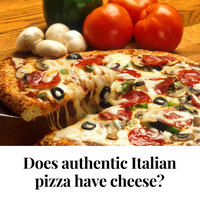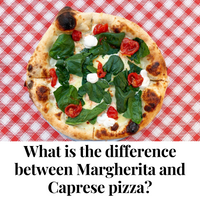Both Mozzarella and Swiss cheese are excellent options when it comes to pizza. They both have a creamy, cheesy texture that goes great with most toppings. However, Swiss cheese is a little stronger in flavor, so it might be good to use it on heavier pizzas or those with intense flavor profiles.
If you're looking for a pizza with the creaminess of authentic Neapolitan pizza shipped directly from Italy to your door in America, don't forget to try out the four cheese pizza for the best pizza experience.
They both may be delicious on the palette, but which one is better for the dish? This article will explore the differences between these two kinds of cheese and decide which one is best for pizza.
Choosing Between Mozzarella and Swiss Cheese For Pizza
When you're making a pizza, you'll want to choose between Mozzarella and swiss cheese. These two kinds of cheese have pros and cons, but you may have questions about their differences.
Here are some other factors to consider when choosing between Mozzarella and swiss.
Choosing Between Mozzarella and Swiss Cheese
The choice between Mozzarella and Swiss cheese for pizza isn't as simple as choosing the type of cheese you like. The two kinds of cheese have different properties and tastes, and you can use the information they provide to help you decide which is best for your pizza.
Both are rich in calcium and protein, and they contain varying amounts of Vitamin A and Zinc. However, the most significant difference is the fat content, and Mozzarella is higher in fat than Swiss cheese.
While both are good sources of calcium, Swiss cheese has significantly higher Vitamin A, vitamin D, zinc, and potassium levels. If you want to know more about rennet on pizza, click here.
Therefore, you should choose your cheese based on what nutrients you're seeking in your pizza. Swiss cheese contains a higher fat percentage than Mozzarella, which melts more quickly.
While both kinds of cheese are mild, their flavor lies another difference. Fresh Mozzarella is more temperate than its rival Swiss counterpart, while traditional Mozzarella is more expensive than its mozzarella cousin.
Both types contain pasteurized whole milk, calcium chloride, and vegetable rennet. They are rich in calcium and fat, but Mozzarella is the most commonly used cheese on pizza.
Differences Between Mozzarella and Swiss Cheese
If you're wondering which cheese to use for your next pizza, here are some differences between Mozzarella and Swiss.
- Fresh Mozzarella is packed in liquid form, while traditional Mozzarella is sold in blocks. The former is easier to find but more expensive.
- Both are made from cow's milk and contain the same nutrients and fat. Make sure to read the ingredients label before you buy either cheese. You can also substitute Mozzarella with another cheese if you don't have it on hand.
- Mozzarella is higher in calcium, while Swiss cheese is lower in fat and sodium. Both have similar melt-ability properties, and they are excellent sources of protein, zinc, and vitamin A.
- They're also both excellent sources of calcium, which makes them good options for pizza.
- Because both cheese slices contain similar amounts of nutrients, they're easy to substitute if you don't have your required cheese.
Using Mozzarella vs. Swiss Cheese on Pizza
While both Mozzarella and Swiss cheese melt and cook almost the same way, they have distinct differences in flavor and how they bake in the oven. So, in the middle of baking, you may wonder, "can you substitute mozzarella for swiss cheese?"
The answer is yes; you can substitute Mozzarella for swiss cheese as long as you enjoy the spicy taste. Many people enjoy the combination of bitter Mozzarella and nutty, aged Swiss cheese. Hence, ensure to try out four-cheese pizzas; you might just fall in love with them!
Fresh Mozzarella is available in a liquid form. Traditional Mozzarella, on the other hand, is sold in blocks. These two types of cheese contain the same ingredients, including pasteurized whole milk, vinegar, calcium chloride, and vegetable rennet.
Swiss cheese remains on top of the game compared with Mozzarella for nutritional facts, but Mozzarella remains the king of Italian cuisine. So, for best results, read labels to ensure you're getting the best cheese for your pizza.
Substituting Mozzarella for Swiss Cheese
If you're wondering if substituting Mozzarella for swiss cheese will work, you can try Edam. This semi-hard cheese has a mild flavor with nutty undertones and is made from partially skimmed milk.
It has a firm texture and easy melting, making it a good substitute for Mozzarella on pizza. You can also use Gouda, a rich buttery flavor, and semi-hard cheese made from whole milk.
While melted Mozzarella is the most common substitute for swiss, other cheese types can also work well. Provolone and Mexican cheese are excellent alternatives for Mozzarella, and both have a mild flavor.
Some substitutes may even be more acceptable than the original cheese. In either case, you can still enjoy your pizza while avoiding the swiss cheese. The key is to find a cheese that works well with the dish you're making.
Swiss Cheese Vs. Mozzarella Nutrition
While you can find both kinds of cheese in the grocery store, you may be wondering how the nutritional values of Swiss cheese and Mozzarella compare. These two types of cheese are similar in taste and melting ability, and both are considered high-quality sources of protein.
Swiss cheese, on the other hand, is much healthier than Mozzarella. Swiss cheese is higher in calcium and magnesium. These nutrients contribute to strong bones and heart health.
In addition to being higher in protein and lower in fat, Swiss cheese is also lower in sodium. It is often recommended for people with high blood pressure.
However, cheese is still high in calories and saturated fat. Typical cheeses contain about 70 percent fat, most of which is saturated. Swiss cheese is much healthier for your heart and waistline than Mozzarella, but it will also cost you a pretty penny.
If you're watching your salt intake, you may want to stick with Mozzarella. Both kinds of cheese are delicious and have the same amount of calcium, protein, and fat content. Also, it is generally aged longer than Mozzarella.
Do Mozzarella and Swiss Go Together?
If you've ever eaten a pizza with a Swiss cheese topping, you've probably wondered: do Mozzarella and swiss go well together? Both kinds of cheese are very similar in taste, and they melt almost equally.
Swiss cheese is made from cow's milk, while Mozzarella comes from the buffalo. Swiss cheese is similar to Mozzarella in color and texture, but it has a milder taste.
While both types of cheese are delicious, they differ in the amount of salt they contain, making them suitable for different dishes. If you're unsure whether either cheese is ideal for a recipe, try substituting one for the other.
In a sandwich, Mozzarella adds a classic stretch and doesn't overpower the flavors of the cheese. Cheese and fruit also pair well. Fresh or dried fruit and nuts are traditional Cheese Accompaniments.
These sweet flavors balance out the saltiness in most cheeses, including Mozzarella. Dried apricots and green grapes are great accompaniments for Mozzarella. And as long as you keep in mind the cheese's saltiness, they'll be perfectly fine.
Swiss Cheese Vs. Mozzarella Taste
Do you know the difference between Swiss cheese and Mozzarella? The taste of the two cheese slices is very similar, but they have distinct characteristics.
However, if you're not in a cheese-eating mood, you can try either of these cheeses with your favorite recipes.
Compared to Mozzarella, swiss cheese has a milder, nutty flavor. It is also easier to melt and doesn't have the stringy, gritty texture of Mozzarella. The milder, more pliable cheese makes it an excellent substitute for Mozzarella in many dishes.
Both slices of cheese, Mozzarella and swiss, are good options when you're running out of one or the other. But be aware that neither has a distinctly superior taste.
While Swiss cheese is the poster ingredient, provolone has a tangy aftertaste. If you're not in the mood for a Swiss cheese sandwich, you can also use provolone, a soft cheese from Italy, for the same flavor.
The taste of provolone can be similar to that of Swiss cheese, though you may find it better than Mozzarella.
The Italian-style cheese, Mozzarella, is a popular choice for melted pizza and pasta. Mozzarella is made from buffalo milk and is becoming more popular worldwide. Its milky flavor is rich and creamy, perfect for salads.
If you're wondering if you can substitute Mozzarella with swiss for pizza, you can - simply beware of the pungent smell and strong taste, and this may be your new favorite combination.
Final Word
In conclusion, if you're looking for a creamy and flavorful cheese for your pizza, Mozzarella is the way to go. On the other hand, Swiss cheese works excellent as cheese for your pie because of its high salt content.
So which cheese should you use? It depends on your preference and what ingredients you have on hand. Either one will give your pizza that perfect cheesy flavor. To order the creamiest Neapolitan goodness straight from your home, order Margherita pizza and keep enjoying pizza!
Our real Italian pizzas from Italy are handmade with all-natural of high quality and fresh ingredients in Naples, Italy delivered to you, anywhere in the U.S. Free Shipping Nationwide. Order here now!








0 comments